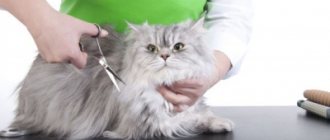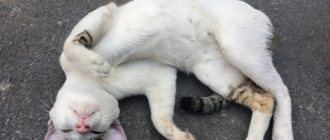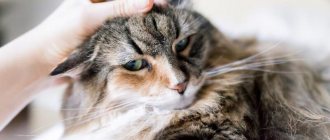There are many things cats do that we consider rare. They are part of normal cat behavior that guardian cats eventually adapt to. Some of them are characteristic of cats as a species, others are characteristic of an individual cat. This does not mean that they are not necessarily healthy or that they indicate a problem in your well-being. The type of behavior we define as odd in this HowMeow article is common in a healthy cat. Such strange or abnormal behavior could highlight a physical or psychological problem that needs to be addressed.
If you love yourself, “ Why is my cat acting strange?? ”, It can be very difficult to determine the root cause. However, it is necessary, which means taking our veterinarian with you.
The cat is stealing
A cat can steal both food from the table and things.
If your purr is carrying treats, it may be lacking in vitamins and minerals. Change the food, give your pet treats more often, and the cat will stop pulling sausage from the table. When a furry fidget pulls things, such as hair ties or socks, it is most often a game. Buy your cat a couple of new entertaining toys. Let it be not just balls and squeakers, but toys with a “secret” where you can hide a treat. While the cat is trying to get it, he will satisfy all his instincts.
It happens that a cat steals food and hides it in hard-to-reach places: under the bed or under the chest of drawers. This is how the predator instinct manifests itself. It happens that cats who are taken into the house from the street or from a large cat pack behave this way. They are afraid that the food will run out quickly, so they put aside pieces for a “rainy day.”
It's difficult to deal with this. For the first time, cover all places where your pet can hide food. Over time, this habit will disappear on its own. The cat will make sure that there is always food in the bowl and will stop hiding pieces in secluded places.
Why does a cat fuss, run, often meow nervously, and run away from the house?
A week ago my parents arrived from Moscow; before that, the cat and I were left alone on the farm. Periodically, the cat was locked at night when it was necessary to go to work. The cat was released in the morning, the cat felt well, and no changes in behavior were observed. But after 3 days something happened to the cat.
Some strange things began to happen in his behavior:
- often meows nervously and protractedly for no reason, looking at one point, standing still;
- as soon as he comes home, he grabs a piece of food without chewing and rushes back to the door, asking to go outside;
- does not respond to calls “kitty-kitty, let’s go home”, but begins to meow frequently;
- in the evenings he looks for distant dark corners (in the closet, on the desk among folders), where he had not been lying before;
- runs around the apartment in small dashes, fussing;
- the eyes are crazy, as if frightened by something;
- outwardly it seems that he has lost a little weight.
Tell me, please, what could be the reasons for this cat’s lifestyle? I really need your help and advice.
Such a story happened to my cat (a long time ago) and for a long time I also could not understand the reason for his hysterical behavior, although the cat had been neutered since adolescence and for about 7 years behaved as a eunuch should - quietly and peacefully.
Then it turned out that large beetles had flown into the house (it was in the spring) and hid under the furniture, and at dusk they crawled out, scaring our Chernysh, who did not know where to go. During the day he tried to crawl through the bars on the windows, although he had never done this before - he was afraid of the street, because our nursery is German and they scared him once when he was little, since then he sat only on the threshold of the house, and then his nose didn't stick out. We thought that he had lost his mind, we took him to the veterinary clinic and there they told us that the cat was stressed and was very frightened by something.
The truth was revealed three days later: at night, the cat’s heartbreaking cry woke us up and we discovered a large black beetle on his back (I don’t know the name), and seven more near his food bowl! They almost went crazy with fright - they had never seen anything like them before.
When the beetles were collected and thrown out, and the floors were washed to remove their smell, then our Blackie slowly calmed down and stopped raging.
Perhaps your cat was scared of guests, there are some animals that can’t stand strangers in the house - my godmother’s cat died of a heart attack (6 years old) when there was a noisy party in the house (they had never made much noise before).
They are so gentle, so I advise you to contact your veterinarian so that he can examine the animal and give qualified recommendations.
If the cat is mischievous and behaves strangely
The cat's behavior may be inadequate to the owners' expectations, but it is always adequate to the cat's condition and cannot be a reason for expressing dissatisfaction or, especially, punishment. With its strange behavior, the pet reports a problem that is bothering it. He has no other way, because animals cannot speak like humans.
Any problem can be solved, and the experience of the Murkosha shelter, based on interaction with more than 3,000 cats, clearly proves this. Each cat has its own specific character. Moreover, the scale of its external manifestations can vary greatly depending on many factors.
What determines a cat's behavior?
Health status. The first step in case of behavior change is to consult a veterinarian and make sure that there are no health problems. In addition to behavior changes, there are other alarm bells.
Read more: “Signs of a sick cat”
Hormonal imbalance. Unsterilized cats and female cats constantly have high levels of sex hormones, which inevitably affect behavior and health in the most negative way. For the sake of the pets themselves, they need to be neutered.
Read more: “Sterilization is a conscious need”
Age-related changes. Just like in humans, advanced age can affect the health of animals and their cognitive functions: memory, attention, coordination of movements, spatial orientation. These changes, in turn, can provoke not only behavioral patterns, but also other problems.
Elderly cats need help to adapt to a new situation for them, check their health once every six months and contact a veterinary clinic if you notice any changes. Sometimes a small rearrangement in the apartment is enough, in other cases medication prescribed by a doctor may be needed.
Discomfort. Perhaps the cat is uncomfortable using some important household items. Most often, problems are related to the location of the tray: there is too little space or, on the contrary, it is located in an open space, a washing machine rattles nearby (even if it does this rarely), water drips from a tap or shower on top, the tank makes noise when filling with water. Likewise, it makes sense to check resting areas, food bowls, scratching posts, etc.
Negative experience. Cats have a good memory - they remember grievances and other negative moments of the past for a long time. Trauma, severe fear, abuse, and punishment can trigger mistrust, panic, aggression, depression, and other problems.
Read more: “Why you can’t punish cats?”
But don’t give up, everything can be solved with enough effort. We can confirm this based on the example of working with typical wards of “Murkoshi”. Of course, their socialization requires time, patience and care, but there are no hopeless cases, no matter how difficult they may seem.
Read more: “If a cat has character”
Changes. Cats are animals of habits, preferring stability to exciting adventures. No, you cannot lure them onto this hook of your own free will. Moving, rearranging, traveling - all this causes severe stress for cats.
Read more: “Moving with a cat”
Whatever of these and similar things you do, pay special attention to the psychological comfort of the cat and help her adapt to new conditions.
Read more: “First steps in a new home”
Strangers. This applies to both people and animals. Moreover, animals can even be neighbors, but they are too active in terms of sounds or smells. A cat (even a sterilized one) can react especially zealously to marks on the other side of the front door. After all, this is an attempt on her territory! And this is not to mention the appearance of new pets in the house.
Read more: “How to make friends between a cat and a cat?”, “How to make friends between a cat and a dog?”
New people in the apartment can also provoke an unexpected reaction from the pet. Some particularly sensitive people react even to short-term visits from guests, courier, plumber and others, but after a few days they usually calm down if there are no other stress factors. The situation is more complicated with non-acceptance of a new family member or roommate. In such a situation, competent behavior of the owner and the establishment of a truce between the cat and the newcomer are very important.
Read more: “Birth of a child and a cat”
Human behavior. Intrusiveness and familiarity or lack of attention towards your pet may cause changes in its behavior. But sometimes the problem may lie deeper: depression or nervousness of the owner, conflicts in the family, or rejection of the animal by one of them. Cats are indeed inferior in sociality to dogs, for example, but they are not callous creatures at all, and some are very sensitive to human emotions.
Stress has no less impact on the behavior of cats than on the behavior of people. If the stress is prolonged and the cause does not disappear, the cat becomes anxious. At the same time, it is as if the ground is being pulled out from under its feet, since the animal constantly feels threatened and does not feel safe, and this is the foundation of the needs of any living creature.
What NOT to do?
- Leaving everything as it is can lead to serious problems being missed.
- Delaying a visit to the doctor - the health consequences become worse over time, and delay can be deadly for your pet.
- Scolding your cat and punishing it will only make the problem worse and will not improve anything.
- Pressing the cat to come to its senses faster will not make it faster, but it will certainly be worse.
What should be done?
We hope you found this article helpful. On the website of the Murkosha shelter you can find other materials that contain important information for owners and those who are just planning to get a cat.
The cat is behaving inappropriately. Signs of inappropriate behavior in cats
Kitty, you are inadequate) Suddenly the cat starts rushing around the apartment, peeling wallpaper from the walls along the way, and at night you wake up from the cat’s heart-rending screams.
How to determine what kind of insanity this is?
If a dog’s body language clearly tells us about its desires, then with a cat it’s more complicated. What could be the reasons for a cat’s strange, inappropriate and even extravagant behavior?
Why do cats act crazy?
It doesn't depend on the breed. Any cat, regardless of origin and upbringing, for some unknown reason begins to run from room to room and meow.
At the same time, its speed is comparable to a racing car on the track. The meowing projectile rushes around the apartment, looking around everywhere, and then suddenly stops abruptly.
This kind of uncivilized behavior is also called “midnight madness.” The cat becomes active, jumps on your bed, trying to get its paws onto the pillow next to your face, inviting you to play. There are several reasons for such wild and funny madness.
Ancient predator instincts
Each cat retains the primitive desire for predation caused by its ancestors. With this behavior, your cat may be demonstrating hunting tricks, fighting positions, or escape techniques.
The domestic kitty is always fed and watered; she does not need to look for food.
But the accumulated energy needs to be spent, so here you have crazy behavior.
Cat toys such as mice, pen wands and laser pointers encourage the cat to demonstrate natural abilities that are indispensable when hunting: the cat grabs, jumps and runs. The effect is enhanced if you play outside.
Night instincts
Some baleen-striped animals prefer a nocturnal lifestyle; accordingly, they are more active in the dark. If the cat is not tired during the day, expect a lot of activity at night.
Domestic cats sit idle during the day, waiting for their owner to go to work. In the evening, your cat will ask you to play with her. If her needs are not met, the unspent energy splashes out. Kittens are especially energetic.
Aging
An older cat may act strangely due to mental problems. The brains of older animals work in a different mode, causing strange behavior. Check if your cat has these.
Insects
The cat's behavior can be explained by the fact that she has fleas, and they are simply biting her! She may meow and call for help if she is hypersensitive and cannot reach the itchy bitten area.
Strange Behavior Can Be a Cry for Confidence
Cats, in some ways, can become more attached to the place they live than the people they live with, although this depends on the cat's personality and the relationship they have with their owners. Most of the time, these strange behavioral problems are the cat's way of screaming for love and confidence. If you find your cat desperately trying to pet their faces against you and everything they encounter when they settle into your new home, it is because cats have scent glands that are found on their cheek. Cats love the smell of their domains, it makes them feel secure as they mark their territory.
My cat suddenly lags behind
Physical illness is not the only reason why a cat may act strangely. Cats are very sensitive animals, and any change in their routine can cause stress and changes in your behavior . Common changes in a cat's life that lead to behavioral disturbances include:
- Move to another house
- New family member
- About processing
- New noises (even ones we can't hear)
- Changing your diet
- New pets in the area
- Traumatic experiences (eg, veterinary visits)
Often we cannot determine the cause of stress in our cat. Their perception and understanding of the world is different from ours. There are many stressors that affect cats that seem harmless to us. In any case, if we see clear signs that our cat is stressed, we will have to do something about it...
Symptoms of Stress in Cats
If you suspect your cat is stressed, here are some possible symptoms of stress in cats:
- They act strange/abnormal
- They are hiding from us
- Lack of appetite
- Excessive grooming
- Obsessive bite
- Urinating/defecating in a litter box
- Other stereotypes
This strange behavior is most often associated with stress. However, they are also the same or similar to certain physical problems . For example, a cat with a urinary tract infection may urinate out of its liter box. This is another reason why we should go to the vet to get the correct diagnosis...
Stress can be treated by changing your care, routine and environment. However, it can be difficult to determine the best course of action since each cat is different. Talking to an ethologist or cat behavior is ideal.
People sense that something is wrong with your home.
The heavy atmosphere of their home is felt not only by its owners, but also by other people. If earlier your friends loved to sit at your house over a cup of coffee, now they constantly come up with an excuse not to do this. Guests entering your home may experience a sudden deterioration in their mood or even their well-being. You and them may begin to have sudden, violent arguments and quarrels. There are cases when the evil spirits living in an apartment selectively influence people entering the house, not allowing men into it. They become very uncomfortable, and an irrational reaction of panic and a desire to leave the confines of the house as soon as possible appears. At the same time, you may have excellent relations with them in another territory. Pets sense someone's invisible presence and behave strangely. It’s as if they see someone else besides you in an empty room.
Why do cats become suddenly active?
Just five minutes ago everything was calm, and suddenly there was a hurricane. Your furry pet, with the excitement of a hunter pursuing prey, rushes to your feet, arches his back, his eyes sparkle. Or vice versa - it watches every movement and attacks you from ambush. The cute cat, who was dozing in a chair five minutes ago, has turned into a small predator.
You can try to calm a raging domestic tiger by pouring water, squawking, or clapping your hands. But with such a reaction you will most likely only spur the animal to further action. It is better to try to channel your pet's unbridled energy into a more peaceful direction.
The need for play and movement is natural. She can be satisfied by playing with her friends or toys - a ball, a paper “butterfly”, a toy mouse. If you cannot get another member of the cat family, then play with your cat yourself several times a day. And only when you feel the approaching start of “hostilities”, and on your own initiative.
And so that you don’t have to wake up from a cat attack at night, play with the “tiger cub” before going to bed. You can protect your sleep by simply closing the door, but then you may have to listen to dissatisfied meows and the noise of falling objects.
Is your pet getting ready to pounce again? There is no need to express concern. Be glad that he is healthy and energetic.
The cat is constantly reaching for water
Many cats love water, although they do not respond to it in the same way as dogs. Cats prefer to approach water on their own terms, and don't like to cheat on them.
When it comes to drinking water, cats are more attracted to running water or dripping water from a faucet because it is a natural way for them to interact with water.
But water in a bowl is less likely to attract your cat's attention since they can't smell it or see it move. If you're worried that your cat is drinking too little due to a "less interesting" form of water, try experimenting
Give her the opportunity to “hunt” for water, “catch” it, or even better, try to get water for you on her own.
If you are concerned that your cat is drinking too little due to a “less interesting” form of water, try experimenting. Give her the opportunity to “hunt” for water, “catch” it, or even better, try to get water for you on her own.
Here are just a few aspects of your cat's strange behavior. If you notice any unusual habits in your pet, do not rush to immediately run to the veterinarian.
Think about it: maybe your cat just doesn't have enough attention, or maybe she's trying to show her natural instincts.
Photo source:
Add “Pravda.Ru” to your sources in Yandex.News or News.Google, or
Fast news in the Telegram channel of Pravda.Ru. Don't forget to subscribe to stay updated on events.
Spreading the scent (with your help)
Cats have many scent glands throughout their bodies, from their toes and the corners of their mouths to the tops of their foreheads and the bases of their tails. These sebaceous glands (and the pheromones they secrete) are why your cat rubs her cheek against yours and stretches out on the couch—they send the signal that that object or place is your cat's “property.”
By starting the massage above the tail, you take this ritual of spreading the scent into your own hands. Your cat presses her butt against you and raises her back to give you better access to the scent gland near her tail.
How to find a cat
If the animal still runs away, a search should be organized immediately. If this is a dacha or cottage community, then advertisements posted in places where almost all residents visit - near the store or the office - usually help you find a cat.
A cat that is allowed to walk outside on its own must be microchipped. Although the best option would be a collar with a tag that shows the owner's phone number and name.
You need to be especially attentive to your pet if there is a forest nearby. The cat's natural instincts will lead him there, and he will easily get lost.
If the pet is already old, then, first of all, you need to inspect all the nooks and crannies in the yard or garden - a sick animal usually does not go far, but looks for a secluded corner
It is important to remember that the cat's safety is in the hands of the owner.
My cat is acting strange and doesn't want to play
Having looked at the most common reasons why our cat behaves strangely, there is another stage of her life that needs to be considered. Just like people, cats will change their habits throughout their lives. For example, after kittens open their eyes and begin to walk, they will begin to play energetically . However, after a while this behavior will decrease.
The decrease in play activity is especially noticeable in older cats . This is partly due to the effects of aging. The cat's joints and bones will become weaker, have less energy, and be more susceptible to degenerative diseases. For this reason, regular examinations are recommended every 6-12 months for all cats over 6 years of age. To find out what else to look out for, you can check out our article on the top 5 signs of old age in cats.
Another reason why your cat becomes uninterested in interactions is depression. If they are unhappy , they may lose their motivation. The reasons why your cat is depressed vary and can be difficult to determine. They may also be similar to the reasons why your cat is stressed, since not all cats will react to the same stimuli in the same way. Discussing treatment options with your veterinarian is the best course of action...
The cat sleeps, and then suddenly jumps up and hides
Mystics are sure that cats can interact with otherworldly forces, are guides to the world of the dead, see and feel spirits, and communicate with brownies. The cat's quirk associated with suddenly waking up and running away is explained by the activation of the dark forces living in the apartment. An evil spirit frightened the cat, and he had to escape.
The scientific explanation is that cats, unlike humans, have much more developed senses. In her sleep, she heard a sound from the street that seemed dangerous to her. Following her instincts, the sleepy cat chose not to figure out what happened, but to run away.
Reasons for strange behavior
Quite often, dog owners notice serious changes in the animal’s behavior after grooming. This is especially noticeable after the first time. The dog may begin to hide from everyone, refuse food and water, and even show aggression. Sometimes he actively itches, whines or walks strangely.
All these rather disturbing symptoms are a reaction to the shortening of the coat. It is not always the master’s fault, but in most cases it is due to the characteristics of the dog itself.
Veterinarians identify three main reasons for changes in dogs’ behavior:
Embarrassment. When he finds himself without his fur coat for the first time, especially if the haircut is ultra-short, the dog feels embarrassed about himself
She realizes that she looks strange, that she has lost a very important part of her appearance, and experiences strange physical sensations. It’s as if a person hasn’t had a haircut since childhood, and then suddenly shaved almost bald.
In this state, the dog will show fear and embarrassment. Attempts to hide, not to contact friends, especially animals, refusal of food and water at first, reluctance to make close contact in the first day are quite normal and expected reactions. Give him time to get comfortable, come to his senses, leave him alone with himself for a few hours. As soon as the animal gets used to the new sensations and understands that nothing terrible has happened, its behavior will return to normal.
Irritation and minor wounds. It is thanks to them that the dog constantly itches and licks the clipped areas, because of them he walks strangely or even cannot go to the toilet normally. This happens if you shave your puppy too short for the first time, almost to zero. This is especially true for areas with delicate skin, such as the genitals, butt or ears. If you notice something similar in your animal, the main thing is not to let it lick or scratch itself, as this will only increase the discomfort. Treat the skin areas with an antiseptic and give an antihistamine and sedative. Repeat taking the products and treating your skin for several days, and everything will get better. Most animals, over time, with sufficiently frequent repetition, overcome this effect; their skin gets used to the effects of metal in the machine and no longer gives such a reaction. But if you trim no more than 2 times a year, then you will either have to experience irritation every time, or cut your hair not so short.
Symptomatic treatment
If the cat’s usual behavior has changed for the worse and remains so for several days, then the animal should be taken to the veterinarian to find out the reasons.
The following symptoms should alert the owner:
- the coordination of the animal’s movements is impaired;
- changes in heart rate and breathing;
- detached gaze at one point, reluctance to move;
- unjustified aggression;
- licking the fur until it is wet;
- Unreasonably jumping into nowhere, hitting with paws into nowhere, hunting for an imaginary but non-existent object, hitting walls.
If an animal suffers from a physical illness or has internal injuries, it must be treated accordingly. The doctor will conduct an examination and prescribe medications.
If the cat is nervous due to psychological problems, the specialist will prescribe mild sedatives.
At home, you can calm your cat with a few drops of valerian or motherwort. Drugs such as “Stop-stress”, diazepam, cat bayun have proven themselves well.
In severe cases, for example, if the cat is afraid of absolutely everything, and it needs to be transported on crowded public transport for a long time, veterinarians may prescribe sleeping pills. The animal will fall asleep in the carrier and will not show any anxiety. But you should not get carried away with such drugs, and even more so, prescribe them yourself. Sleeping pills are serious medications with a lot of side effects that may not appear immediately. The use of tranquilizers is a one-time measure when there is simply no other way to transport the animal.
The cat sits in or on a box
Cats seem to really like to sit in or on top of boxes, no matter where they are: in a warehouse, at home, in a garbage dump, in a store. The fact is that cats are constantly exploring something, and the box is one of the things that they use for these purposes, and make it their potential shelter from danger.
Constantly jumping and sliding into the box gives them the opportunity to exercise their instinct to find a safe space, similar to what happens in the wild.
Providing boxes and other similar spaces for your cat is an inexpensive way to enrich your home environment and provide an enjoyable experience for your cat.
Try not to keep toys in these areas and always ensure that the environment is safe for your pet.
When it comes to storing your pet's toys, keep in mind that retrieving them from storage should not be a difficult task for your cat.
Reminds the cat of her mother
The first four months of your kitten's life are both hectic and filled with growing independence. A curious kitten will follow its mother around and will quickly learn important daily cues (such as where to sleep, when it's time to eat, and how to groom). Kittens learn to raise their butts high in the air to give mom unobstructed access to their insides for two important reasons:
- To cleanse the entire body (cleansing away dirt and grime after a long day).
- stimulate bowel movements by licking the anal area.
No matter how old your cat is, these tail scratches can remind her of early childhood with her mother and kitties. Do you see where this will lead? A raised butt can be an awkward case of miscommunication.
As a surrogate parent to your beloved cat, your cat's unusual reaction to tail scratching may be a request for undertail grooming. Yes, your cat is indirectly asking you to clean her butt on her behalf.
Lies next to a sick owner
Cats are born doctors: in some amazing way they sense when their owner is feeling unwell. In such cases, they lie down next to you, take away the bad energy, and the person feels better. After this, the animals themselves may get sick, but they sacrifice themselves for the sake of their beloved owner.
It is interesting that cats sense a person’s illness, even if he himself feels well. If your pet was previously not very affectionate, and now she won’t get away with it, perhaps it’s time for you to think about your health. When an animal is constantly pressed against a specific part of the body, this indicates that the source of the disease is hiding there.
Bites
Never use your hands for hunting games with your cat. Prolonged stroking can cause an aggressive reaction in the animal. So pet your cat for one or two seconds and stop. If the cat wants to continue, she will let you know. But stop petting immediately as soon as you feel the animal’s body tense.
Many people think that a cat lies down on its back in front of its owner because it wants to be stroked on its belly. In fact, this is just a sign of trust, while almost all cats really don’t like it when their stomach is touched and are ready to protect this vulnerable part of the body with their teeth.
Sensory nerve endings
Many cats enjoy gentle tail strokes while rocking themselves to sleep or cuddling with a loved one on the couch. However, mild tickling can quickly turn into wild, annoying overstimulation. While the line between relaxation and irritation is undoubtedly thin and easy to miss, the explanation is quite simple.
A cat's tail is a 12″ (30.5 cm) extension of its highly sensitive nervous system (spine), containing tons of nerve endings in one small cluster at the base of the tail. Prolonged or aggressive scratching can cause a pain or stress response in these sensitive nerve receptors.
As a result, a raised butt and a high-pitched meow may mean, “Hey, it's ticklish!” or “Oh, that hurts!” Sudden irritation or even biting may be a sign of petting aggression in animals with tight wounds.
How experience affects a cat's behavior
Cats have a good memory, especially for negative situations. And a negative experience can radically change an animal, even if the breed itself is kind and affectionate. If the animal had a negative experience in life, for example, it was thrown out, beaten by the previous owners, starved, treated poorly, then this will leave a serious mark on the cat’s soul. And subsequent owners, if they decide to take such an animal for themselves, will find it difficult to tame a pet that is disappointed in people.
Note! Due to a negative experience, the animal will bite, hiss, and scratch everyone who wants to approach it. And, on the contrary, if an animal has been surrounded with love and affection since childhood, then even an aggressive breed can be as affectionate as possible not only towards its owners, but also to everyone who comes to their home, including friends. All this is because the pet has a rule in his head that people are not dangerous and love him, so there is nothing to be afraid of
All this is because the pet has a rule in his head that people are not dangerous and love him, so there is nothing to be afraid of
And, on the contrary, if an animal has been surrounded with love and affection since childhood, then even an aggressive breed can be as affectionate as possible not only towards its owners, but also to everyone who comes to their home, including friends. All this is because the pet has a rule in his head that people are not dangerous and love him, so there is nothing to be afraid of.
An abandoned cat will never forget what was done to him
Symptomatic diet and procedures
If the animal’s mood is justified by natural physiological needs, you need to either find a way for the pet to satisfy them, or resolve the issue of castration of the animal. Today there are tablets that suppress the sexual desire of animals. But they are no better than castration, because they contribute to depression in cats and the development of malignant tumors.
If an animal suffers due to some kind of stress, then this problem can be solved with medication and psychological methods. Medicines must be prescribed by a doctor. And you should not get carried away with them, so as not to treat your pet for liver, kidney and other ailments.
Psychological methods include distraction, physical fatigue and the stress method. The last method is to overload the animal's nervous system. For example, a cat is afraid of the street. You need to take it outside, increasingly increasing the time it stays, until the animal stops being afraid. This method is best used under the guidance of a zoopsychologist, so as not to aggravate the cat’s mental state.
Distraction consists of finding an interesting activity for the pet (turn on the TV), delighting it with a new toy, and giving the cat a little more time. Physical fatigue comes down to “herding” the cat. Moreover, to such an extent that the animal could only fall and sleep, it did not have the strength and desire to be distracted by negative emotions.
If a domestic cat is about to move, which it will most likely be afraid of, it is better to worry in advance and place the animal in a special carrier. This way the cat will be much calmer; the enclosed, cramped space will give her a sense of security. You should not carry the cat in your arms, or wrap it in a jacket or diaper. She can break free and run away, not knowing where, or scratch her owner.
After any stress, the cat needs to be calmed down. It is better to do this through stroking and scratching behind the ear. Cats are sometimes like children; they vitally need the realization that everything is fine, even if terrible shocks have been experienced.
You should not skimp on affection and attention towards your pet. He really needs the care of his owner.
What mystical things can cats see?
Almost any cat behaves inappropriately from the point of view of its owners from time to time:
- frozen, without looking up, he looks at one point, where there seems to be nothing suspicious;
- suddenly jumps up, even if she was previously sleeping serenely, and runs out of the room with a hiss for no apparent reason;
- suddenly gets scared (back like a rocker, tail like a pipe, fur standing on end);
- stubbornly avoids a certain place (closet, sofa, corner of the room, etc.).
When a cat is scared of something, he may see something mystical
This behavior suggests that the animal is seeing something mystical:
- Brownies and house spirits who either play with or frighten a cat living on their territory.
- Ghosts and other entities from parallel worlds that can come for various purposes or wander in accidentally.
- The souls of deceased people who previously lived in this house. Very often the spirit of a loving and departed owner returns to visit his pet.
Our brownie, for some reason it seems to me that we have one, can’t stand cats and drives them out in every possible way. Male cats usually behave extremely anxiously, flinch, get scared and try to run out in every possible way. Cats feel completely calm, although from time to time they also look intensely at something.
A cat can see what a person cannot see
Description of possible causes
If a cat behaves restlessly for a long time, then first it needs to be carefully examined for possible injuries. If no visible damage is found, then the possibility of parasites should be excluded.
It is not possible to do any more diagnostic measures at home. Especially in cases of viral infections and congenital pathologies (mainly hearts in decorative breeds). In any case, you need to keep in mind the following possible causes:
Worms
A common phenomenon even in pets that do not go outside at all.
Unfortunately, some owners are sure that if their animal does not go outside, then there is no place for it to pick up parasites. However, this is a big misconception, since worms can get to a pet through food (raw fish, meat), from the soles of shoes (the same owner can bring parasite eggs from the street), after bites of mosquitoes, sand flies, fleas, or from other animals (that visit street).
Symptoms are always different, but in most cases, owners notice that the cat is behaving strangely, its gait may change, or it will try to bite itself. If there is severe itching (and it happens often), the pet may scratch its butt on the floor or constantly lick the anus area until it becomes bald.
In severe cases, bloody diarrhea and vomiting may occur. Then it’s better not to risk it and take a stool test to identify the type of helminths. As for treatment, today there are enough drugs against worms with a wide spectrum of action (Drontal, Milbemax, Stronghold, Kanikvantel, Prazicide).
For kittens up to 6 months of age, monthly treatment is recommended. Further treatments are carried out once every 3-6 months.
Fleas
Very often they cause restless behavior in cats, since the bites of these insects can be accompanied by an allergic reaction to their saliva.
Even if the pet does not go outside at all, parasites can get onto its fur from the soles of the owner’s (or his guests’) shoes, grass (the favorite treat of all cats), things (carrier, comb, etc.).
The first signs of the presence of these insects in an animal is the appearance of black specks in the fur (can be the parasites themselves or their metabolic products). Symptoms may also affect the color of the coat (it will become dull) and the skin (there will be redness in places).
If there is no large fireplace in the house, then it is very easy to remove fleas with the help of special preparations that are applied to the withers. They are effective against sexually mature individuals and their eggs. Stronghold and Frontline are considered the best today. Many veterinarians also recommend mandatory disinfection of the apartment using special means. This will help avoid relapses in the future.
Allergy
It can cause a lot of discomfort to the animal, as in most cases it is accompanied by unbearable itching. Along with this, redness and peeling may appear on the skin.
The affected area often swells. This reaction can be provoked by poor nutrition (most often), insect bites (flea dermatitis), contact with chemicals (household chemicals, poisons, etc.).
In case of a severe allergic reaction, you must immediately give your pet an antihistamine (diphenhydramine, Zyrtec, Claritin). Immediate hospitalization is required in cases where there is a risk of suffocation (bites of stinging insects on the tongue, in the neck area) or the development of anaphylactic shock (reaction to medications).
A bite of an insect
During the season when stinging insects are active, when the windows into the house are almost always open, there is a risk of your pet “meeting” a wasp, bee or bumblebee. A bite from any of them can cause not only restless behavior in a cat, but also provoke a severe allergic reaction (if the bite is in the area of the mouth, eyes or oral mucosa).
The owner needs to carefully examine the suspected bite site for the presence of a sting (if it is present, it must be removed without fail). In most cases, swelling subsides within a few hours, redness disappears within 1-2 days.
Separately, I would like to say about kittens whose strange behavior may be associated with infectious diseases (rhinotracheitis, herpes, calicivirus). But, along with this, other symptoms are almost always present (discharge from the nose, eyes, paroxysmal cough). Only timely vaccination will help you avoid an “encounter” with these life-threatening viruses.
Watch this video on YouTube
My cat is acting strange and meowing
Although we may not speak the same language, vocalizations in cats are an important means of communication. Despite its importance, it is not always well understood. To interpret the different types of meows in cats, we need to look at the context of their behavior . If your cat is acting strange and meowing, it may manifest itself in the following ways:
- Long, high-pitched vowels
- Inappropriate urination
- Increased aggression
- Too loving
- Lying in strange positions
- Excessive friction of objects/people.
If your cat is showing the above signs, they are most likely in rutting season. This will affect them throughout their lives, but can begin as young as 4 months. When symptoms appear, they can be unexpected and mysterious . This is a physiological process that will continue if intervention is not performed.
Neutering is recommended by veterinarians. This will not only prevent your cat from acting strangely This is due to the fact that sterilizing a cat reduces the risk of various diseases and also stabilizes the production of hormones. For more information, you can check out our article on the advantages, disadvantages and cost of neutering cats...











